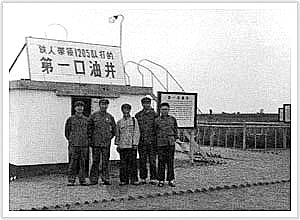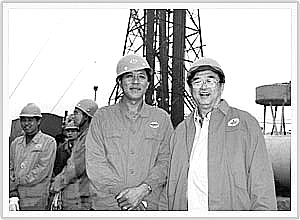
Qin Yongcheng’s "First Oil Well" in Daqing Oilfield. Pictures are data pictures.

Qin Yongcheng (right) is with oil workers in Panjin Oilfield. Pictures are data pictures.
[Great motherland, unforgettable songs].
"Splendid rivers and mountains are picturesque, and the motherland is building a cross-horse. It’s a great honor for me to be an oil worker and travel around the world wearing an aluminum helmet … …” This heroic ode to oil workers is not only a clarion call to encourage oil workers from generation to generation to join in the construction of the motherland, but also an overall portrayal of the outstanding heroes of the working class in China. Although it was written more than half a century ago, it is still so exciting and exciting to sing today.
The composer Qin Yongcheng (1933— 2015) is the first generation composer trained in New China. During more than half a century’s creative career, he has created a large number of musical works with high artistic achievements and wide social influence, such as the song "I offer oil for the motherland", "Chairman Mao travels all over the motherland", My People,My Country, vocal concerto "Haiyan", symphonic poem "Two Little Cowboys" and movie music "Entrepreneurship" and "Marshal and Soldiers". He made great contributions to the music, art and education in our country all his life.
Three days with the "Iron Man"
In 1964, a notice brought Qin Yongcheng into close contact with Li Jiefu, a famous composer and president of Shenyang Conservatory of Music. It was this notice that made him have an indissoluble bond with oil workers all his life. In March this year, China Musicians Association organized some composers to experience life in Daqing Oilfield and created a batch of works reflecting oil workers. Dean Hijacking also received a notice, asking him to report to Sarthou, Heilongjiang Province on March 20th. After receiving the notice, the dean of the robbery immediately made preparations for leaving. Due to physical reasons, the college is going to find a young man to accompany the dean of the robbery to "go north". At the suggestion of the dean of the robbery, Qin Yongcheng will accompany him. Unfortunately, Qin Yongcheng was suffering from a high fever and had been in bed for three days. Upon hearing this, Dean Hijacking personally visited Qin Yongcheng’s home and told him to rest at ease for illness. In the face of this rare opportunity, Qin Yongcheng looked forward to his early recovery. Although his fever had gone down the next day, he was still very weak, and insisted on accompanying Dean Jiefu.
On the evening of 19th, Qin Yongcheng got his wish and boarded the train to the north. In the car, Qin Yongcheng finally put forward the question that was hidden in his heart: "Where are we going to Sarthou?" Dean Hijacking told him quietly: "Sarthou is a big oil field, called Daqing Oilfield, and it is still confidential." After moving to Daqing, Qin Yongcheng lived with many famous musicians such as Lv Ji, Qu Wei, Wang Xin, Zhang Lu and Jiefu in the guest house of Daqing Petroleum Command.
Since the next day, the oil field has arranged courses for musicians to introduce oil-related knowledge, from exploration and drilling to oil production and refining for ten days, with one content per day. Ten days later, the oilfield arranged for them to experience life in the first line. Qin Yongcheng, Jiefu and Wang Xin (songwriters of "Singing the Motherland") were assigned to the "1205 Hero Drilling Team" with Wang Jinxi, the "Iron Man", and lived together with the "Iron Man" for three days. During this period, Wang Jinxi told Qin Yongcheng that when he held a People’s Congress in Beijing in 1959, he saw that the buses in Beijing were in a heavy mood because of lack of oil and carrying gas bags. He also listened to him tell the story of the Daqing Petroleum Congress. In the spring of 1960, Wang Jinxi’s drilling team was in Yumen Oilfield. When it was heard that a large oil field had been discovered in the north, the whole country was going to hold a general meeting there, and immediately asked the superior to fight. They said goodbye to their relatives and boarded the train going north in their light clothes. Faced with the harsh climate, hard living and working environment, and poor equipment, oil workers shouted the loud slogan of "if you have the conditions, you should go if you don’t have the conditions" in order to get rid of the label of "poor oil" as soon as possible and break the economic blockade of western hostile forces. "When the oil workers roar, the earth will shake three times."Qin Yongcheng’s soul was strongly shocked and greatly impacted by his earth-shattering fearless revolutionary heroism. Especially in the days spent with Wang Jinxi and his heroic drilling crew, Qin Yongcheng’s understanding of oil workers has been greatly sublimated, and he has a strong emotional resonance. He is determined to create works that can reflect the spirit of oil workers to express his high respect for them.
A masterpiece completed in the canteen of the hostel.
After three days of experience, Qin Yongcheng returned to the guest house, and the Propaganda Department of the Party Committee of the Oilfield prepared a batch of lyrics reflecting the work and life of Daqing Oilfield and oil workers for them, hoping that composers would compose music for them. After the old composers had chosen the lyrics, Qin Yongcheng also chose them. At this time, a lyric jumped into his eyes, which was written by oil worker Xue Zhuguo, "I offer oil for my motherland." This first-person lyric is vivid and vivid, which vividly depicts the heroic and optimistic mood of oil workers and the fearless revolutionary spirit of fighting against the world. The more Qin Yongcheng watched it, the more he liked it. The more he watched it, the more excited he became. At this moment, he was inspired and full of thoughts. In the canteen of the hostel, he finished writing this work in just 20 minutes.
Inspired by the artistic conception of the lyrics, the prelude of the song adopts a fast speed, a lively and elastic rhythm, and a fluctuating melody line, like a train full of oil workers galloping in the splendid rivers and mountains of the motherland, from the northwest of the motherland to the northeast thousands of miles away. Then, the heroic song of the oil workers was introduced: "The beautiful rivers and mountains are picturesque, and the motherland is building a beautiful horse. I am honored to be an oil worker and wear an aluminum helmet to travel all over the world." The melody of the song is broad, fresh and smooth, which vividly depicts the bold spirit of oil workers and the revolutionary optimism full of pride and self-confidence. On the word "kua" of "kua steed", the melody absorbs the elements of rap music and adopts a sliding tone, which is not only in line with the rhyme of Chinese four tones but also forceful, and can better highlight the bold and hearty character of oil workers. These four sentences are lyrical paragraphs, which vividly depict the heroic fighting spirit and optimistic spirit of oil workers moving to the north and south and being at home all over the world.
In order to show the dauntless heroism spirit and heroic spirit of oil workers, who are "fearless of heaven, fearless of earth, and fearless of storm, thunder and lightning", Qin Yongcheng treated these two lyrics into short and powerful eight-point dotted notes and syncopated rhythm, which made the music more powerful and dynamic. At the same time, it not only forms a sharp contrast with the previous lyric paragraphs, but also lays a good foundation for the climax of the whole song that appears later.
The climax of the song is in the last two phrases, "I contribute oil to my motherland, where there is oil, my home is there". In order to make the climax of the song more prominent and infectious, Qin Yongcheng ingeniously treated the first beat at the beginning of this sentence as a rest, and started the word "I am" from the weak beat to highlight the word "ancestor" in the next section. Then, on the word "oil" for "offering oil", the melody adopts a circuitous upward movement, forming a large-span 10-degree interval in the range. In the last four bars of the song, Qin Yongcheng skillfully used the drawl of China’s traditional opera music for reference. It is worth mentioning that in the first draft of the work, the last four sections are not like this, but after Qin Yongcheng returned to school, he sang the work to friends and students, listened to and adopted everyone’s suggestions, and changed the original last simple melody into the current one-stop drawl. In this way, the music is more infectious and dynamic, which not only depicts the free and easy character of oil workers, but also makes the whole song end in an atmosphere full of optimism and pride. The revised work was published in the journal "Music Life" of Liaoning Branch of China Music Association, which soon became a hero’s ode to oil workers in the north and south of the motherland and inside and outside the Great Wall.
The only "composer of oil workers"
The first singer of this song, Liu Bingyi, a famous baritone singer of the former Central Orchestra, also played an important role in the promotion of this song. He and Qin Yongcheng also became attached to this song, and it was sung for 50 years. And Qin Yongcheng also started from this song, and successively created a number of excellent works reflecting oil workers. In 1973, as a key project of the Ministry of Culture, Changying filmed a feature film "Entrepreneurship" reflecting the Daqing Petroleum Congress, and specially invited Qin Yongcheng to create music for this film. Qin Yongcheng lived up to expectations, and created a number of well-known songs in his film music, such as Looking at Beijing with deep feelings, Entrepreneurial songs, and The Fragrance of Oil in Tianya Wan Li. Because of Qin Yongcheng’s outstanding contribution to the creation of oil-related music, the vast number of oil workers are familiar with the name Qin Yongcheng and affectionately call him "the composer of oil workers". In 1994, China Petroleum and Natural Gas Corporation (formerly the Ministry of Petroleum Industry) awarded Qin Yongcheng the honorary title of "composer of oil workers", and he was the only composer in China to win this honor. In 1996, China Records Corporation awarded Qin Yongcheng the "Golden Record Award" for this work, which was later included in the 20th century Chinese classics.
Praising the motherland and people and eulogizing the times and life are the themes of Qin Yongcheng’s life creation. It is precisely because of Qin Yongcheng’s deep patriotism, deep thoughts and feelings for the broad masses of the people, including oil workers, rich musical language based on Chinese excellent musical culture, and continuous absorption of rich nutrition and creative sources in the long-term in-depth social life that he created such immortal masterpieces represented by "I Contribute Oil to the Motherland", which are full of positive energy and the main theme of the times, and have high artistic value and appeal to both refined and popular tastes. (Author: Wei Huang, former vice president and second-level professor of Shenyang Conservatory of Music)
关于作者